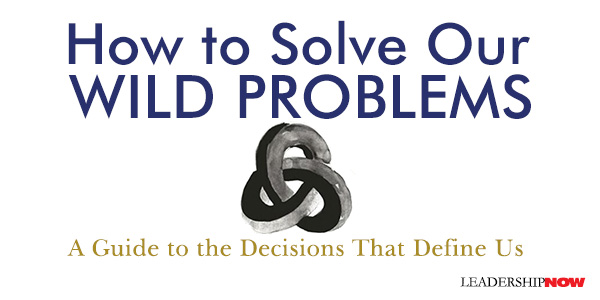 |
 |
12.19.22

How to Solve Our Wild Problems
THERE ARE PROBLEMS that can be solved by a simple cost-benefit analysis. But there are problems where the solution lies beyond that — something deeper — something irrational even. The big decisions in life, what Russ Roberts calls Wild Problems — whether to marry, who to marry, what career path to follow, ethical dilemmas — “can’t be made with data, or science, or the usual rational approaches.” In 1838, Charles Darwin faced a wild problem. Darwin was trying to decide if he should marry. Like many, he made a list of the pros and cons and wrote them down in his journal. But marriage, like most wild problems, can’t be reduced to measurable rational reasons. It is much more nuanced than that. Not everything can be boiled down into a yes or no. But more than that: Making a list of pluses and minuses when facing alternative universes is a way of trying to imagine what it will be like under each choice. Thus seems rational and is a version of trying to maximize what economists call expected utility—your expected well-being in the future.
At the top, he wrote, “This is the Question – Marry – Not Marry.” Then on the pro side, he tried to imagine what it would be like to be married. On the right side, he tried to imagine what it would be like not to marry.
Darwin is looking at marriage from just what you can see from the outside—the outer life of marriage. Darwin’s list tells us more about Darwin than it does about marriage. His list of pluses and minuses—especially the pluses—is the list that someone would make who has never been married and has no access to the upside of the inner life of a married man. Darwin’s ignorance is part of the reason his negatives about marriage (banishment! Degradation! Idle fool!) are so emphatic and his positives are so mild (female chit-chat). It is hard to define what the consequences of your choice are about to make if you have no experience with the choice you are about to make. You can’t really know the costs and benefits of a choice until you have experienced it. Darwin can’t rightly judge the upside of marriage and so he can’t know if the expected costs outweigh the expected benefit. Not only that, if he gets married, the experience will change him in ways he can’t imagine—what he values and what is important to him. Moving beyond costs and benefits—pain and pleasure—is the idea of flourishing. “Flourishing includes living and acting with integrity, virtue, purpose, meaning, dignity, and autonomy—aspects of life that are not just difficult to quantify but that you might put front and center, regardless of the cost.” So what do we do when faced with a wild problem? Roberts suggests we begin by approaching the issue by privileging our principles. That means considering what kind of person you want to be and what you want to become. Your decisions define who you are. Don’t make tradeoffs when it comes to your essence. Live with integrity. Do the right thing and respect yourself. That at least should be the starting place. One way to do this is to have rules that you follow no matter what. It helps to make deciding what to do simpler. For example, your rule might be, “I am the kind of person who doesn’t make jokes about my spouse in front of other people even when they are incredibly funny.” Roberts adds, “Rules are useful in maintaining who you are, our sense of self. But they’re probably even more important in helping us become who we might want to become.” Here are a few concluding thoughts from Roberts: Try to have more experiences than fewer. Try stuff. Stop doing the stuff that isn’t for you. 
Posted by Michael McKinney at 10:58 AM
|
BUILD YOUR KNOWLEDGE
 

How to Do Your Start-Up Right STRAIGHT TALK FOR START-UPS 
Grow Your Leadership Skills NEW AND UPCOMING LEADERSHIP BOOKS 
Leadership Minute BITE-SIZE CONCEPTS YOU CAN CHEW ON 
Classic Leadership Books BOOKS TO READ BEFORE YOU LEAD |